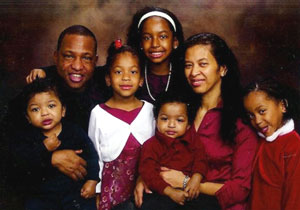CHARLENEM

LOS ANGELES (FinalCall.com) – When Ervin Lupoe shot and killed his wife and five children, and then himself in their Wilmington, Calif. home, the deaths were another example of the human cost of joblessness and an economic crisis that has many people panicked over how they will survive these troubling times.
In the suicide note he left behind, Mr. Lupoe said that the Jan. 27 deaths were his wife Ana’s idea after both were fired from Kaiser Permanente Medical Center about two days earlier for falsifying records in order to receive affordable childcare. A Los Angeles Police investigator reported there was no crime scene indication that the wife had anything to do with the murders of their children–Brittney (8), twin daughters Jaszmin and Jassely (5) and twin boys, Benjamin and Christian (2).
Mr. Lupoe’s suicide note said he had been discriminated against and had to file a grievance with his union to get the position he lost, which was a Special Procedural Technician, and that an unnamed administrator told him at work one day, “You should not even had bothered to come to work today. You should have blown your brains out.”
“So after a horrendous ordeal my wife felt it better to end our lives and why leave our children in someone’s else’s hands. In addition, it seems Kiaser Permanente want’s us to kill ourselves and take our family with us. They did nothing to the manager who stated such, and did not attempt to assist us in the matter, knowing we have no job and 5 children under 8 years with no place to go. So here we are,” Mr. Lupoe wrote.
His letter alleged additional problems: His administrator told the couple that they would not be eligible for unemployment but his wife applied anyway. The couple also sought copies of their licenses from Kaiser to look for other work and were referred to their union representative, who directed them to human resources, to no avail.
Anthony Krump, a Kaiser spokesperson, told The Final Call that the company is confident no one told Mr. Lupoe to take his life and the lives of his family. He did not say whether other disciplinary measures were at Kaiser’s disposal, besides firing both workers and parents. In an interview, he told The Final Call, “The co-workers, employees, and physicians, are experiencing a great deal of loss and grief as well … they (the Lupoes) were well known and well liked,” Mr. Krump said.
On the day of the Lupoe shootings, Mayor Antonio Villaraigosa released a five-page press release, which listed mental health, foreclosure and employment counseling and resources.
“The economic uncertainty is driving workers to the brink, but that should not lead people to resort to extreme measures. Help is available. Resources exist … If you need assistance know that we are ready with open arms and open hearts to guide you through this tough stretch and ensure that everyone emerges from this crisis with their livelihoods–and lives–intact,” Mayor Villaraigosa said.
Some say information about resources should be better publicized and more outreach is needed to get the information to vulnerable communities, and especially people who do not e-mail, fax or use the internet.
“What about them?” asked a Bay area-based community resource professional, who requested anonymity. Even with such service lists, he feels some people don’t get needed help because of how they are talked to, treated or herded in government job and welfare agencies when they finally take that giant step.
“You’ve got to look at this from all the different angles, for example, no matter what resources are available, this man also had some mental health issues. If my whole life is all about work and employment, and then all of a sudden that rug is pulled from under me, and then I’m being asked to go to the Employment Development Office and engage in things that I have no experience about, am not used to and don’t understand, that can be overwhelming,” the counselor said.
Another question is what made Mr. Lupoe go from zero to a final option, said the counselor, who has worked with people needing jobs and with youth. “It’s easy to say there’s a history of vindictiveness or that he could be evil, but if this was a good man, a family man and he fell on hard times, then in his mind, and I’m not excusing it, this was his only option.”
Diana Bonta, vice president of public affairs Kaiser Permanente, stated in a Jan. 28 release that the Lupoes were terminated with good cause and that throughout the process they were treated with dignity and respect.
Dr. Earl Ofari Hutchinson, author and syndicated columnist, said the entire ordeal raises the question of how Kaiser handles personnel employee-management relations. “Is there due process procedures, a grievance process and that’s important because this is not the first complaint that my organization (the Los Angeles Urban Policy Roundtable) has received about the treatment of Black employees at Kaiser,” he said. Some of those complaints involved discrimination and retaliation, he said, and that leads him to believe that there was a flaw and breakdown in Kaiser’s system.
“Two weeks before the Lupoes’ incident, there was a murder-suicide in Inglewood where a young man killed himself and his son and in Baldwin Hills, a man set his house on fire, killing himself and his daughter but his wife escaped. Given the severe economic crisis we’re in, where many more people are obviously facing financial hardship, that also means that psychologically, mentally and emotionally, people are distressed and that may cause more acts of violence,” Dr. Hutchinson told The Final Call.












